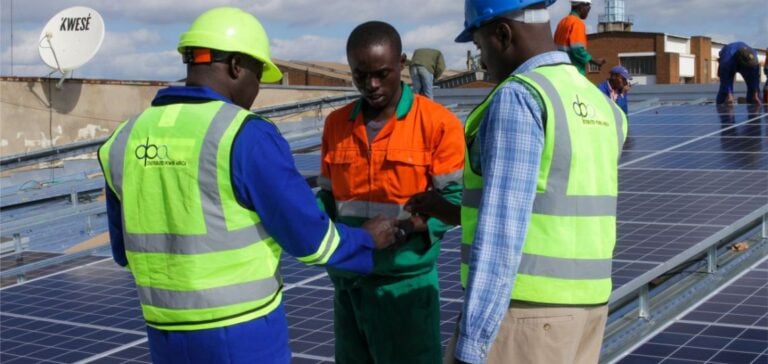The transition to a green economy could present a historic opportunity for Africa. According to a recent analysis from the “Forecasting Green Jobs in Africa” report published by FSD Africa and Shortlist, the continent could generate between 1.5 and 3.3 million direct green jobs by 2030. These jobs, spread across several key sectors, would meet the growing needs of Africa’s youth and contribute to the fight against climate change.
Potential by Sector and Subsector
The report identifies the energy sector as a major employment driver, with a projection of 2 million new jobs, representing 70% of potential green jobs. Solar energy, in particular, shows the most promise, with 1.7 million potential jobs linked to the manufacturing, installation, and maintenance of solar panels. Additionally, electricity transport and distribution could create approximately 197,000 more jobs. Other renewable energy sources, such as hydropower and wind, are also considered growth drivers, especially in regions like East and Southern Africa.
Agriculture and nature conservation represent the second-largest green employment sector, with about 700,000 potential jobs. Climate-smart agricultural technologies, such as drip irrigation and agroforestry, could provide up to 377,000 jobs. Meanwhile, activities like aquaculture and poultry production, primarily in West and Central Africa, could generate around 189,000 jobs in response to the growing demand for protein. Ecosystem conservation through mangrove restoration projects and natural park management is also a promising area, with an estimated 117,000 positions.
Country Analysis: Champions of the Green Economy in Africa
Certain countries on the continent are particularly well-positioned to become leaders in green job creation. In South Africa, the solar sector could generate between 85,000 and 275,000 jobs by 2030. In Nigeria, agricultural technologies and aquaculture could provide 60,000 to 240,000 positions. Kenya could see job growth in the solar sector and electric mobility infrastructure, with projections ranging from 40,000 to 240,000 positions.
In Ethiopia, hydropower is the key sector, with forecasts of around 33,000 jobs. With its hydraulic potential, Ethiopia could become a regional leader in renewable energy. Finally, in the Democratic Republic of Congo (DRC), the hydropower sector, notably through the Inga dam project, could create up to 45,000 jobs, thus supporting the country’s industrial and energy development.
Challenges of Qualification and Training Needs
For these job forecasts to become reality, the issue of workforce qualification is crucial. The report notes that nearly 60% of green jobs will require some technical expertise, including skills in solar facility maintenance or renewable energy engineering. Approximately 10% of these positions will require a university degree, while 30% will require specific technical certification. About 40% of forecasted green jobs will be unskilled, offering entry-level opportunities for young Africans, especially in the sanitation and recycling sectors.
Political Challenges and Financial Needs
The transition to a green economy requires substantial investments, estimated at nearly $100 billion annually. These funds should finance the development of infrastructure needed for the production and distribution of renewable energy. In parallel, favorable regulatory reforms and tax incentives could encourage private investments and reduce the financial risks associated with new projects.
Finally, close cooperation between governments, private companies, and educational institutions will be necessary to align local skills with market needs. The report thus recommends public-private partnerships to strengthen local capacities in innovation and sustainable resource management.






















